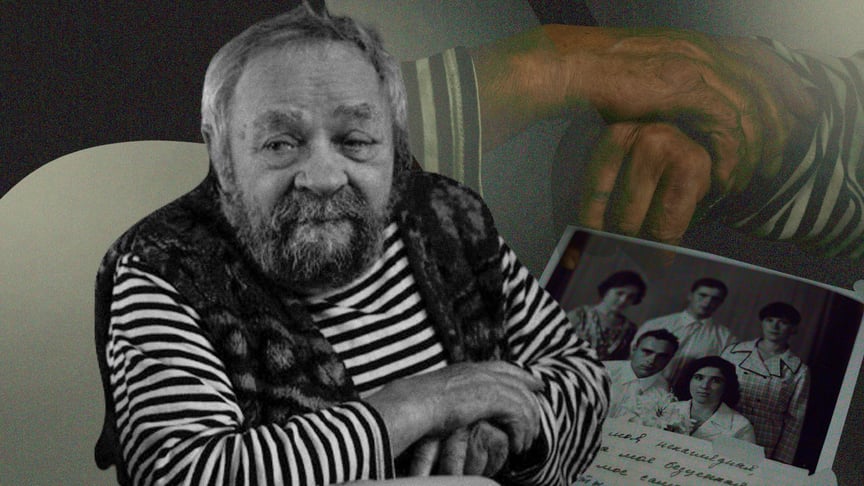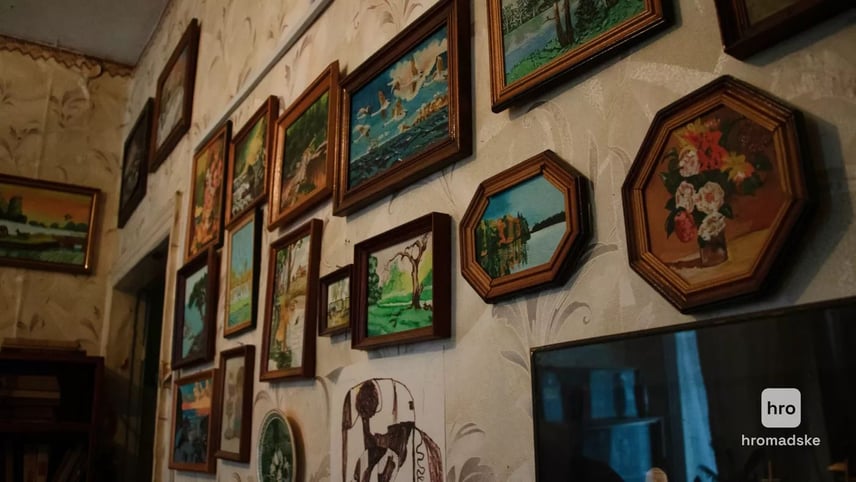“Four wars” of 81-year-old Chernihiv resident Oleksandr Syhachov

“I survived four wars,” says Oleksandr Syhachov. “I was born in 1942, and lived under occupation for 19 months with my mother and grandmother. Then in the 60s, during the Cuban Missile Crisis I served in the navy. Soviet warships were then put on full alert at sea, and no one knew how it would end. Then there was Chernobyl, and as a train commander, I was evacuating children from the affected area. Would you say it was not a war?And the current one is the fourth!”
Today, a man in a vest welcomes us to his home in a slightly cluttered kitchen in Chernihiv. Oleksandr hospitably invites us to taste the dishes he has prepared. When we refuse to eat, he offers us coffee.
“Four of my peers died, but that didn't stop me much”
Mariia, Oleksandr's mother, was a Ukrainian language teacher. His father was a military pilot, originally from the Voronezh Governorate. Little Oleksandr grew up mostly with his grandmother, who raised him. During the Nazi occupation, his mother worked, like other residents of Chernihiv, loading Ukrainian black soil into wagons to be transported to Germany.
Oleksandr remembers his childhood and his family clearly from the age of four or five. He says that the entire street above the Stryzhen River, where their house was located, was destroyed. After the Second World War, according to historians, Chernihiv was among the ten most destroyed cities in the Soviet Union.
The postwar period was marked by famine, even in the city. In 1947, Oleksandr recalls, he and his grandmother would go to the store, where the saleswoman would give 150 grams of bread to a working family member and 100 grams to a dependent. Little Sashko would equalize his mother's piece with the others by the time he got home. She didn't scold him, she just stroked his head and cried.
The boy's childhood was full of adventure and danger. Oleksandr recalls going to a nearby church where there was a warehouse of ammunition left over from the war: “All the boys from the street ran there, and I did too. Four of my peers were killed, and two more lost their arms. But this did not stop the post-war boys much.”
In the summer, he and his peers would dive into the Desna River, where there was a German crossing, and get weapons from there. He buried two Schmeisser assault rifles, and when his mother found out, he got a beating.
Not long after, the boys found a box of shells in one of the pillboxes which contained a new German military uniform. Oleksandr took it home, and his grandmother sewed her grandson a jacket out of it — new clothes were a luxury after the war. In the photos of those times, the boy looks teenage confident, but the clothes are too big.
“If you don't know who Russians are, welcome to the navy”
Since the reconstruction of Chernihiv was not an overnight process, educational institutions resumed their work gradually. Because of this, after graduating from high school, Oleksandr did not go on to study, but immediately joined the army, where he served for 5 years.
There were sailors in the family, so Oleksandr himself ended up in the navy, was a diver.
“I started in Sevastopol and finished in Petropavlovsk-on-Kamchatka,” he says.
During his service, Oleksandr felt that he was not treated very well.
“I realized even then that if you don't know who the Russians are, you're welcome to join the navy! It's such a ‘plague’, now, everyone is convinced,” he says.
Probably, the leadership did not like the boy's keen sense of justice, his doubts about the “truths” propagated and imposed by the ruling party. When he remarked that it would be fair if the sons of the prosecutor or the secretary of the district committee or the chief doctor were in the same room as him, he was punished with 10 days in the brig.
At the end of his service, the young man went to Magadan, where his uncle lived. He offered his nephew to earn some money in the north and then return home. Oleksandr fished and hunted wild animals.
Upon returning to Chernihiv, he first worked at a construction site, and then graduated from a railway school and worked on the railroad for the rest of his life, as a train manager.
His traditional round-trip route from Kyiv to Karaganda (a city in Kazakhstan) took 9 days. However, Oleksandr emphasizes that he traveled almost the entire territory of the former USSR. He recalls that on one of his trips he met the famous poet Robert Rozhdestvensky and showed him his poems. He read them and said: “Oleksandr, you are so talented, but such poems will be cause 10 years in camps.”
“I love you so much that there are no words to say it”
Oleksandr corresponded with his future wife, Hanna from Kharkiv, for a very long time. In the 1960s, it was trendy to write to peers in other cities — to the school with the same number, to the same class, and to the person with the same serial number in the class register. But the story of the Syhachovs is different.
Hanna read an article in the newspaper about an advanced construction team that was working to rebuild school No. 9 in Chernihiv. The article mentioned only one name - Syhachov. That's who she wrote to.
Their correspondence continued on and off for almost a decade. During this time, Oleksandr managed to get married while he was in the army, but then ran away from his Russian wife. Later, communication in letters resumed, culminating in a meeting and marriage.
On the eve of the new millennium, in 2000, the couple wrote a memoir of their life and family history for their children and grandchildren. Oleksandr demonstrates the handwritten book, almost entirely written in his wife's legible handwriting and illustrated with old and modern photographs.
The book contains a note to his wife in which Oleksandr wrote on their wedding anniversary that he was so in love that he did not even have the words to say so.
The couple, who had been married for 35 years, had two sons. Hanna worked in a Chernihiv kindergarten. Together with her husband, they wrote fairy tales for the children's magazine Maliatko: Oleksandr would come up with the plot, and his wife would write the story down in Ukrainian and send it to the editorial office.
Syhachov's talent was also revealed in painting. In the room next to the library, there are his landscapes on the wall. He admits that he likes marine themes the most.

The Syhachovs' genealogy book states that their ancestors left no estates, works of art, or jewelry, but were forever remembered for their work.
“And we leave behind the paintings painted by Oleksandr's hand, the poems and fairy tales that we invented ourselves, where there is a piece of us,” Hanna Syhachova wrote for her children and grandchildren.
Andrii, the eldest son of the Syhachovs, was a sailor by family tradition, and has been living with his family in Norway for a long time. His son, Oleksandr’s grandson, is studying in London. He dreams of coming to Chernihiv, but in the meantime, he joins European campaigns in support of Ukraine.
Kostiantyn, Oleksandr’s younger son, lives with his father. And his descendant, 20-year-old Oleksandr, named after his grandfather, has been at war for more than a year.
“I never thought the war would start again”
The beginning of the full-scale invasion caught Oleksandr Syhachov at home.
“I could not have thought that such an abomination would come to our land,” thepensioner says.
His grandson Oleksandr immediately joined the territorial defense. He studied at the Professional College of Transport and Computer Technologies. Even before the outbreak of the great war, he and his friends trained at a training ground. During the war, his school was damaged by the Russians, and he joined the Armed Forces.
“He was 19 years old then. He came and said he was going to war. Where are you going? You are still just a child,” saysOleksandr Anatoliiovych.
When the full-scale invasion began, his grandson offered to evacuate his grandfather, found volunteers, but he refused. He stayed at home. He covered the windows with books. When the shelling intensified, he hid in a shelter.
During March, when Chernihiv was under siege, Oleksandr and his son tried to help their neighbors or strangers as much as they could. When water and gas went out in the surrounding high-rise buildings, some neighbors came to them for water.
“The war takes away a lot of health and happiness from people,” Oleksandr reflects. After the bombing of the stadium, located about a kilometer from his house, his elderly neighbor became very scared, felt sick, refused to eat, and eventually died.
However, the man is optimistic: he believes in Ukraine's victory, because the “empire” must fall. He comes out to the porch to protect us from the dog in the yard. He stands on the doorstep and folds his fingers into a trident. Above it hangs a small blue and yellow flag attached to a beam.
This text is part of the Children of War special project, in which we tell the stories of Ukrainians who witnessed the Second World War or its aftermath as children and are now experiencing another tragedy in their old age.
The publication was created as part of a project funded by the German Foreign Office to support Ukrainian independent journalism.
Author: Iryna Synelnyk
- Share: